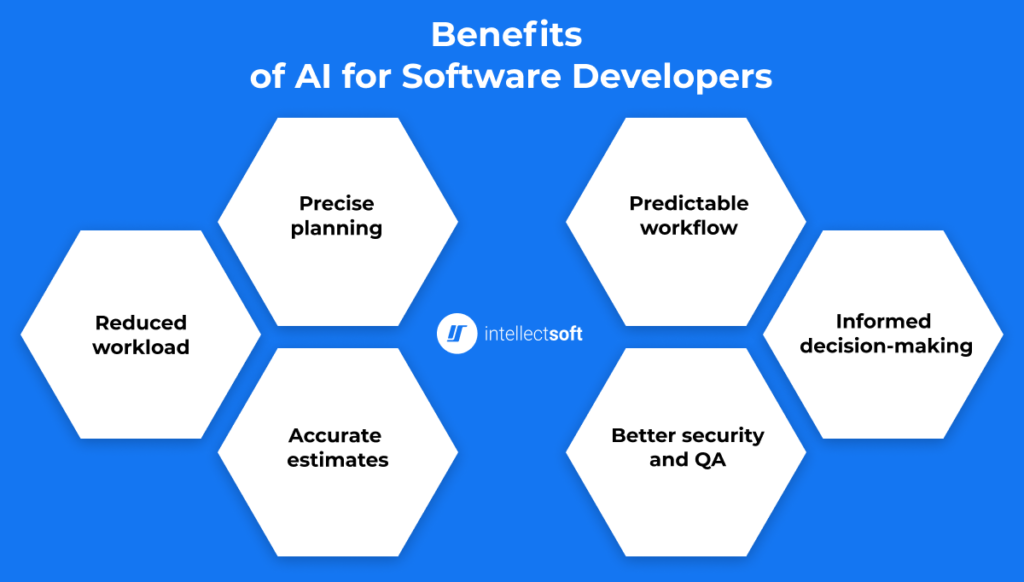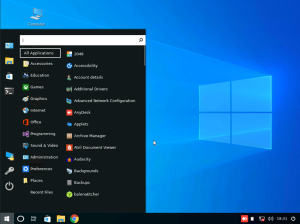AI in software development is rapidly reshaping the landscape of the tech industry, as evidenced by a recent survey revealing that 75 percent of senior developers expect significant transformations in the next five years. The integration of artificial intelligence is no longer a distant possibility; tools designed to enhance coding, testing, and review processes have become staples in many development teams. Nearly half of these professionals utilize AI tools daily, influencing software development trends in ways that empower developers and streamline their workflows. However, this advancement comes with concerns about job security, with some developers wary of AI’s impact on employment opportunities. As we delve deeper into the role of AI tools for coding, it’s essential to understand both the benefits and apprehensions they bring to the industry.
The incorporation of intelligent automation in coding practices marks a pivotal shift for programmers and software engineers alike. As automation technologies advance, there is a growing dialogue around the broader implications of machine learning in programming tasks. Many professionals are finding that these innovative solutions not only expedite development cycles but also raise vital questions about the future skill sets required in tech jobs. While tools leveraging advanced algorithms enhance productivity, they also evoke anxieties concerning the reliability of automated outputs and the potential reduction of traditional entry-level roles. This juxtaposition of efficiency and apprehension encapsulates the current evolution within software design methodologies.
The Transformative Role of AI in Software Development
The recent survey involving senior developers highlights the impending transformation in software development due to artificial intelligence (AI). With an overwhelming 75 percent of the participants indicating that they expect significant changes within the next five years, it is evident that AI is already more than just a passing trend. The integration of AI tools in coding practices is underscored by data revealing that 49 percent of developers use AI tools daily. This trend points to a shift in how developers approach their coding tasks, and these tools are now being recognized as an essential part of the development ecosystem.
Additionally, the capabilities of AI tools, particularly large language models, have instigated discussions about their competence compared to human developers. Almost 53 percent of the surveyed developers believe that these AI systems can code better than most humans, which is indicative of the advancements in AI technology. As AI becomes more embedded in daily operations, developers are witnessing a transformation not only in how they write code but also in how they test and review it. Software development trends are now leaning towards automation and efficiency, driven by AI capabilities.
AI in Software Development: Tools and Techniques
AI tools for coding are rapidly becoming commonplace among software development teams. Approximately 48 percent of developers utilize AI during the coding process itself, while 36 percent employ it for testing and code reviews. These AI applications not only streamline workflows but also enhance accuracy and reduce the time spent on mundane tasks, allowing developers to focus on higher-level programming challenges. This shift towards AI integration signifies a trend where automation increasingly supports developers in their roles.
However, the reliance on AI tools is not without its challenges. Despite the advantages they offer, concerns about job security still linger. Developers are apprehensive about the potential for AI to replace certain roles, a sentiment felt by 14 percent of the survey participants. The impacts of AI are creating a dual narrative — while many view these tools as expansive facilitators that can help junior developers learn more effectively, others worry that AI may restrict opportunities for newcomers by automating basic functions.
The Impact of AI on Developers’ Career Prospects
As artificial intelligence continues to evolve, its impact on developers’ career trajectories and job security poses an interesting paradox. On one hand, a significant 79 percent of developers acknowledge that proficiency in AI tools will be vital for future employment in the tech sector. This awareness is fostering a mindset among aspiring developers to enhance their skill sets accordingly. AI is becoming synonymous with innovation, and those who are well-versed in integrating AI into their projects will likely lead the charge in this competitive landscape.
Conversely, there remains a considerable faction of developers who are apprehensive about the implications of AI on job opportunities. Nearly 37 percent believe that the automation of tasks could lead to a less favorable environment for newcomers trying to establish their careers in software development. This dichotomy illustrates the growing pains of an industry adapting to rapid technological advancements, where the need for AI expertise may outpace traditional job roles yet concurrently challenge the entry of fresh talent.
Concerns Over AI: Privacy and Job Security
Despite the optimistic outlook of many developers towards AI, significant concerns regarding data privacy and job security persist. The survey indicates that nearly 24 percent of respondents express unease about how AI tools manage sensitive information, highlighting an essential conversation about the ethical implications of deploying AI in software development. These concerns are not trivial; as AI becomes more prevalent in coding practices, the assurances surrounding data protection must evolve concurrently.
Moreover, the fear of job displacement weighs heavily on the minds of some developers. With 14 percent citing this as their primary worry, the dialogue surrounding AI’s role in job security is essential for the industry’s future. Employers and policymakers must navigate these trepidations while promoting AI as an enabler, emphasizing that technological advancement can coexist with job creation if managed wisely.
AI and Job Market Dynamics in Software Development
The advent of AI tools in software development is reshaping the job market dynamics, creating a landscape that is both filled with opportunity and fraught with competition. As developers increasingly turn to AI for coding and testing, hiring criteria are also evolving. Reports suggest that 76 percent of employers would prefer candidates with AI skills, underscoring the demand for proficiency in these advanced tools. This trend further emphasizes the necessity for educational programs to adapt and prepare future developers for an AI-centric industry.
Nevertheless, the tension between automation and employment opportunities remains a central theme in discussions about AI. The automation of routine tasks is poised to facilitate job roles; however, there is conflicting sentiment on whether this will create or eliminate opportunities for junior developers. The challenge lies in harnessing the power of AI to enhance productivity while ensuring that entry-level positions are accessible and valuable in nurturing the next generation of developers.
Future-Proofing Careers Through AI Competence
In light of the ongoing transformation within software development, future-proofing one’s career by embracing AI competence has gained prominence. With 80 percent of developers viewing AI as an enabler, acquiring skills related to AI tools has become more than a tactical choice; it is a strategic necessity. Organizations are beginning to recognize that developers who are comfortable with AI can innovate more effectively and drive projects towards success.
Furthermore, as AI tools continue to enhance everyday development tasks, those with AI expertise are likely to find themselves in high demand. This correlation between AI proficiency and employability suggests that training programs, bootcamps, and resources aimed at developing AI skills will become critical. By prioritizing education in AI tools, developers can navigate the evolving job landscape while minimizing fears of job replacement, securing their seats at the table in an AI-focused future.
Skepticism and Resistance Towards AI Integration
Despite the advantages that AI brings to software development, not all developers are wholly optimistic. About ten percent of the surveyed developers express skepticism towards AI’s role in their work. This skepticism may stem from a desire for traditional coding methodologies, fear of decreased job security, or concerns regarding the reliability of AI-generated code. For these developers, AI still represents an unproven concept, particularly in coding accuracy and its implications for professional roles.
Addressing this skepticism involves engaging developers in conversations about the tangible benefits of AI integration, as well as providing avenues for them to voice concerns. By facilitating transparent discussions and demonstrating the reliability of AI tools through pilot programs and success stories, the software development community can foster a more conducive environment for AI acceptance. The key remains to educate and reassure developers that AI is not here to supplant but to augment their capabilities.
AI: An Everyday Tool for Developers
As AI technologies continue to be woven into the fabric of software development, they have established themselves as everyday tools for a large portion of the developer community. With 78 percent reporting regular use of AI tools, the narrative surrounding AI has shifted from novelty to necessity. This pervasive integration is reshaping workflows, enhancing productivity, and allowing developers to leverage these powerful tools to manage complex tasks more efficiently.
Moreover, the positive perception of AI among developers suggests growing acceptance. With many viewing AI as a means to empower themselves in coding, testing, and reviews, a collaborative approach between human intelligence and artificial intelligence is emerging. This evolution positions AI tools as vital contributors rather than disruptors in the software development landscape.
Emphasizing the Need for Ethical AI Practices
As AI’s role grows in prominence within software development, the emphasis on ethical practices becomes essential. Concerns regarding data privacy, security, and the potential biases integrated within AI algorithms necessitate a commitment to responsible AI development. Developers and organizations alike must prioritize ethical considerations to ensure that AI tools are safe, reliable, and respect users’ data rights. This commitment not only enhances the integrity of developed applications but also fosters trust in AI as a transformative force in the industry.
Additionally, ethical AI practices require ongoing education and adaptation. Developers must be equipped with the knowledge and frameworks to recognize and mitigate risks associated with AI implementations. By fostering a culture of ethical responsibility, the software development community can harness AI’s capabilities while safeguarding against unintended consequences, ensuring that technological advancements align with societal values.
Frequently Asked Questions
How is AI transforming software development today?
AI is significantly transforming software development by automating repetitive tasks and enhancing coding capabilities. According to a Clutch survey, 75 percent of senior developers expect AI to have a major impact in the next five years. Many teams now rely on AI tools daily for tasks such as coding, testing, and code reviews.
What are the current trends in AI tools for coding?
The latest trends in AI tools for coding include the integration of large language models that can assist programmers in writing better code and automating debugging processes. Currently, 48 percent of developers use AI during coding, reflecting its growing presence in software development.
What is the impact of AI on developers’ job security?
The impact of AI on developers’ job security is a mixed bag. While some developers express concerns about job loss, 79 percent acknowledge that AI skills will be essential in the future job market. Around 14 percent of developers are worried about losing their jobs due to AI, highlighting the need for adaptation.
Are developers optimistic about the future of AI in software development?
Yes, developers have a generally positive outlook on the future of AI in software development. 42 percent of survey participants view AI positively and believe it enhances their work, with 80 percent seeing it as an enabler rather than a threat. However, concerns regarding data privacy and job security persist.
How do AI tools help in coding and testing processes?
AI tools assist in coding by providing code suggestions, identifying errors, and automating tests. A notable 36 percent of developers utilize AI for testing and code reviews, enhancing the efficiency and accuracy of the software development process.
What are the concerns developers have regarding AI in software development?
Developers have several concerns about AI in software development, primarily centered around data privacy, with 24 percent uneasy about sensitive information handling. Additionally, 14 percent worry about job loss and another 14 percent question the reliability of AI-generated code.
Can AI tools lower barriers for junior developers entering the software development field?
AI tools have the potential to lower barriers for junior developers by providing better resources and enhancing learning capabilities. According to the survey, 45 percent of developers believe that AI could facilitate entry into the profession, while others have concerns about competition.
Why is AI expertise important for future software developers?
AI expertise is vital for future software developers because 76 percent of developers surveyed would prefer to hire candidates with AI skills. As software development evolves with AI tools, understanding how to leverage these technologies will be crucial for professional growth and employability.
What percentage of developers use AI tools daily?
A substantial 49 percent of senior developers and team leads report using AI tools daily, with another 29 percent using these tools most days. This indicates that AI has become an integral part of modern software development practices.
What does the future hold for AI in software development?
The future of AI in software development is poised for significant changes, as many developers believe it will transform the industry in unpredictable ways. Approximately 75 percent of senior developers anticipate major AI advancements in the next five years, suggesting a dynamic evolution of the field.
| Key Points |
|---|
| 75% of senior developers expect significant transformation from AI in the next 5 years. |
| 53% believe large language models can code better than most humans. |
| 49% of developers use AI tools daily, 29% most days, totaling 78% regularly relying on AI. |
| 48% utilize AI for coding, 36% for testing, and another 36% for code reviews. |
| 42% of developers have a positive outlook on AI, 29% feel excited or empowered. |
| 10% express concerns about AI’s application in software development. |
| 24% are uneasy about data privacy issues related to AI tools. |
| 14% cite job loss concerns; another 14% doubt AI-generated code accuracy. |
| 80% of developers see AI as an enabler, while 79% agree AI skills will be crucial for developers. |
| 45% believe AI lowers barriers for junior developers; 37% think it makes competition harder. |
Summary
AI in software development is rapidly becoming a game-changer, with a significant majority of senior developers anticipating a transformative shift in the industry within the next five years. While the majority view AI tools as beneficial for enhancing productivity, concerns about data privacy, job security, and code reliability persist. As AI technologies become integral to coding, testing, and code review processes, developers who cultivate AI skills will likely find themselves at an advantage in this evolving landscape. This progression not only shapes the future of the software development profession but also raises critical discussions about the implications of AI on emerging talent and longstanding practices in the field.




